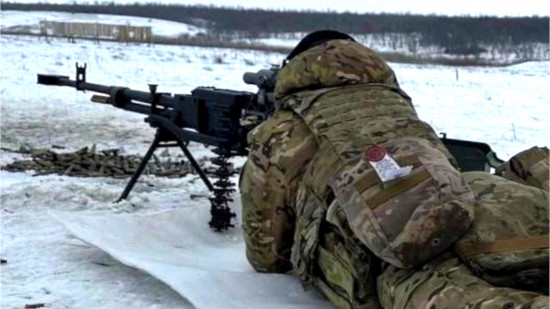When it comes to Russia in 2024, not a lot can shock us any more – the country has reportedly lost at least 70,000 soldiers in Ukraine and it seems ready to lose many more. The reality is horrifying enough. Yet, when I read this week that a Russian military supplier was issuing soldiers with purity seals (protective religious talismans from Warhammer 40k), specially blessed by military priests and printed with Christian psalms, my gut twisted. My favorite silly sci-fi wargame is being cynically spliced into a very real, very appalling war.
I’m not exaggerating the direct relationship between these items and the fictional prayer scrolls worn by soldiers in Games Workshop’s Warhammer 40k factions. As we reported on Wednesday, the manufacturer, Ratnik Tactical, explicitly calls these things “seals of purity”, and has proudly shared images it says show the seals being blessed by an orthodox priest.
They’re strips of yellowed, parchment-style paper, printed with the bible’s Psalm 90, attached to a round, waxy red seal imprinted with the Christian Chi-Ro symbol, and apparently “consecrated in the Main Temple of the Armed Forces of Russia, the Cathedral of the Resurrection of Christ”.
They look nearly identical to the hundreds of tiny grey plastic ones I’ve glued to my Space Marines, and the promotional toy one I got in a special edition of the Warhammer 40k game Chaos Gate Daemonhunters. They simply are replica 40k purity seals, deliberately made to appeal to Russian Orthodox Church believers who also like Warhammer 40,000 lore.
And Ratnik claims that “thousands of seals have already gone to the front”. We can’t verify that, but it’s fair to assume that at least some have.
On one level, this may seem innocuous enough. Soldiers personalize their gear with unofficial tokens of their interests all the time; soldiers like wargames; lots of Russians love 40k. It follows that Russian soldiers may want to buy and wear 40k badges in combat – so do Warhammer nerds from other countries’ militaries.
Squaddies decorating their body armor with Ork faces, the aquila of the Imperium of Man, or the insignia of their favorite Space Marine chapter, is neither a new phenomenon, nor evidence of some mass delusion. Soldiers like to express themselves and remind themselves of their favorite things, while they’re doing a job fraught with terror, danger, and trauma far away from their homes and loved ones. Besides, it’s far from the most offensive symbology worn by Russian troops in the field; neo-Nazi imagery is commonplace, and much more immediately troubling.
Viewed from a more secular country, even the business with the religious blessing could be considered a mere marketing gimmick – and maybe it is. I don’t know how many of these things actually sell, or the real beliefs of the people who buy or wear them. The church and its dogmas occupy a hugely influential position in modern Russian society and politics, especially when it comes to legitimizing Putin’s aggressive foreign policy – but I can’t and won’t speculate on what’s going on in real people’s actual heads.
But you don’t need to jump to conclusions about the psychological and spiritual motivations of individual soldiers to find this development surreal and disturbing.
Think about the chain of events that led to this. A company that normally manufactures and sells plate carrier vests, webbing, and helmets made a deliberate business decision to create replicas of a religious war talisman from a fictional, fascist-theocratic empire invented by British sci-fi nerds in the mid-80s to sell toys. Then a real military church official agreed to bless them in the name of his god, and be photographed doing so. These things aren’t just cheap, cheerful merch; they’re military kit, publicly sanctioned by church and state. It’s absolutely wild that this happened.

Warhammer 40,000’s creators intended their science fiction to convey how terrifying it would be if humanity came under the sway of all-consuming nationalist dogma, an authoritarian, militarist government, and a dominant state religion all at the same time. The Imperium and all its faux-medieval artifacts were first conceived of as a darkly satirical warning – though my colleague Tim Linward has argued at length that the modern franchise scarcely counts as satire any longer.
It’s deeply unsettling to see one of those artifacts turned from a silly, nerdy doodad into a prop intended to tie people’s fandom for Warhammer into their religious faith and national pride. I’ve written before about how playing Space Marines can be a stimulating, but slightly dark experience of fantasy escapism.
The existence of these purity seals feels like an intentional step towards weaponizing that same experience, in the service of perpetuating more real-world death and destruction. Call me over-cautious, but I think that’s a pretty dark and scary thing.
Source: Wargamer




